When you have a baby, especially your first baby, everything is new. Conception and getting pregnant is just the beginning, and as your pregnancy nears its due date, you’re bound to start thinking more and more about life with a new baby. It’s a wonderful learning curve, but it helps to know the stages of baby development in the first year as well as to look at baby sample schedules in the first year so you’re prepared for the joys to come!
Every baby is unique and may not follow these milestones to a tee, but it will give you a guideline to follow so you know what to expect each month during the baby’s first year of development and hopefully answer some frequently asked questions as well as provide those helpful baby sample schedules in the first year.
I also have provided sample sleep schedules for each stage that you can follow or adjust depending on your and your baby’s needs as well as the milestones baby will hit during the first year of life.
For sample baby summaries of my four kids over the years, check out this post!
Or if you’d like to see baby development broken down by month by month with baby sample schedules in the first year as well as summaries, check out these posts:
- Newborn Summaries and Sleep Schedules: 0-3 Months
- Infant Summaries and Sleep Schedules: 3-6 Months
- Baby Summaries and Sleep Schedules: 6 Months to 9 Months
- Baby Summaries and Sleep Schedules: 9-12 Months
Disclaimer: this post contains affiliate links.
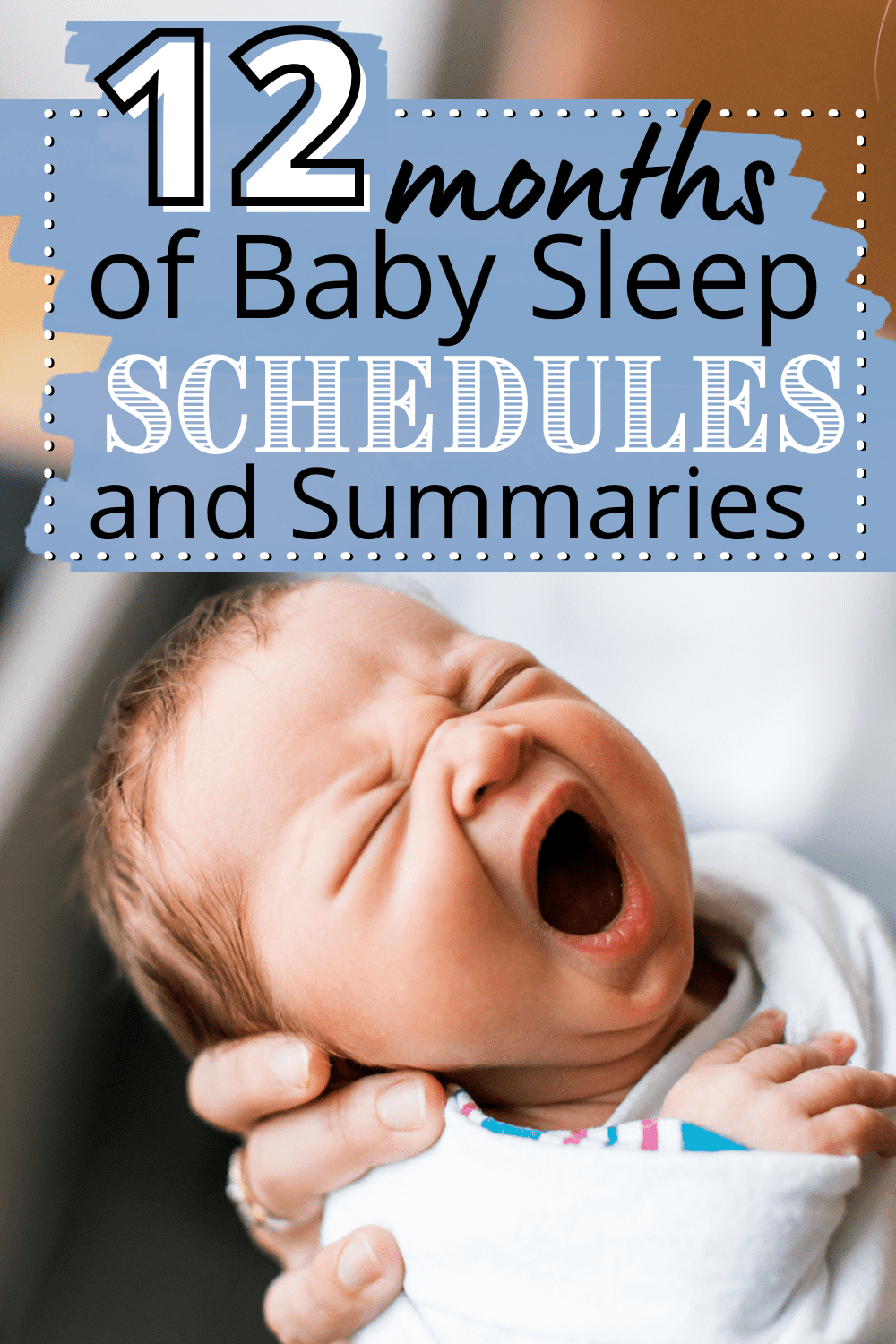
Baby Development in the First Year: Newborn Stage (0-3 Months)
Newborn Baby Development Week-By-Week: 0-4 Weeks
Bringing home a newborn, whether it’s your first or your fifth, is a huge life changer. The primary focus for those first few weeks of a baby’s life is regular feeding–newborns have to be fed every two to three hours.
They can handle very little wake time and sleep a lot. Newborns should get 14-17 hours of sleep a day (according to the National Sleep Foundation) and awake times at this point should be no longer than 45 minutes, and are typically often even shorter than that!
Yes, it is VERY normal for a newborn baby to be awake only long enough to have a diaper change and full feeding. Newborns sleep a LOT and it’s why it’s a great time to go ahead and begin to establish those good sleep habits as well as make sure Mom sleeps as much as possible too.
However, they also have a hard time staying awake during feeding.
Day and night confusion is common.
Gas pain can also present an extra level of challenge! (Trust me gas drops are gonna be your bff)
It is also tempting to start using a pacifier or another sleep/comfort aid for your baby but before introducing a paci be sure to read this post to help avoid sleep prop struggles down the road.
Your body will be in recovery from giving birth and the up and down feeding schedule means sleep is irregular at best; we all know that sleepless nights are the standard for those first weeks of life and a huge priority is making sure Mom gets as much rest as possible.
It’s also a great time to browse the internet while up for those late night feedings. Do you have everything you and baby need for successful sleep training? Be sure to check out this list of must-have sleep items!
This time is also about bonding with this brand new human, learning about each other, and sharing sweet moments together!
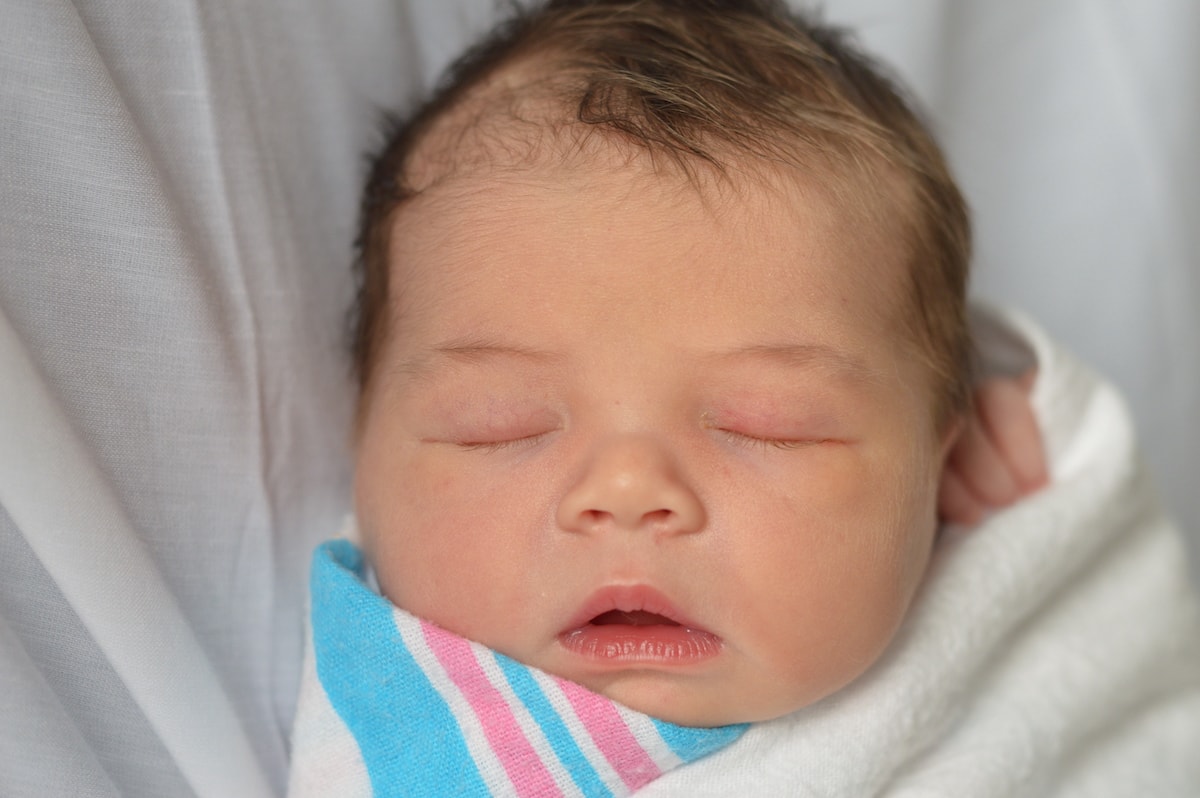
Newborn Sleep Schedules from Birth
It’s never too early to start establishing healthy sleep habits. I started following the Babywise method practically from the start and if you’ve been following Journey of Parenthood for a while, you already know how I feel about it. Safe to say, I highly recommend giving it a shot, but do know that you can adjust it to fit your and your baby’s needs!
The Babywise sleep schedule revolves around the eat wake sleep cycle and establishes a daily routine to promote healthy circadian rhythm and get baby sleeping better faster. Reading On Becoming Babywise is a game changer for implementing sleep training!

Here’s how to get started with Babywise!
These Babywise sample schedules for newborn babies will help you get an idea of what a typical 24-hour period might look like for baby’s sleep, wake times, and feeding schedule.
Speaking of feeding: wondering whether to go with breast milk or bottle feeding? Here is everything you need to know about the pros and cons of breastfeeding vs formula feeding!
Also, here’s everything you need to know about storing and using breastmilk if you if pumping is something you’re considering, too!
The first two weeks are all about getting to know each other and focusing on full feedings. DO not overly be concerned with having your one or two week old baby sleep schedule established yet. Newborn sleep patterns are pretty easy to follow – if they have a full belly, they tend to SLEEP. If you focus on making sure baby gets those full feedings at each feeding session then baby will naturally fall into that 2-3 hour feeding schedule with very little effort required on your end!
At about two weeks old is when I recommend starting to truly schedule the day. It’s essential to begin the day at the same time each morning for that first feeding. The day flows from there! Baby sleep schedules start with the first-morning feeding and then flow from there.
If you are a mom of multiples I also think my schedules will be beneficial as it’s important to keep in mind the needs of your older children when developing a set routine for your new baby. That toddler sleep schedule is crucial too, right?
Babywise Sample Sleep Schedule at Two Weeks
- 7:00: Wake up for the day, 1st morning feeding. We do a diaper change after each feeding and have some awake time with her during the day.
- 8:00-10:00: Nap – put down for nap at first sign of sleepiness
- 10:00: 2nd feeding
- 11:00-1:00: Nap
- 1:00: 3rd feeding
- 2:00-4:00: Nap
- 4:00: 4th feeding
- 5:00-6:30: Nap
- 6:30: 5th feeding (Here I went 2 1/2 hours instead of three because this is a babies toughest time of the day and the fussiest)
- 7:30-9:00: Nap
- 9:00: Massage/Bath bedtime routine (I reversed the bedtime routine to be before she ate her last “meal” so she could go straight to bed after and I would nurse her to sleep basically at that feeding.)
- All other feedings I made sure to keep her awake and have awake time after the feeding! For the night feeds we change her diaper before she eats so she could go straight to sleep after eating
- 9:30: 6th feeding then straight to bed
- Whenever she woke up (typically around 3:30 or 4): 7th feeding, then straight to bed
Baby Sample Sleep Schedule at Three Weeks
- 7:00: start of the day, eat
- 8:00-8:30: awake time then down for nap
- 10:00: eat
- 11:00-11:30: awake time then down for nap
- 1:00: eat
- 2:00-2:30: awake time then down for nap
- 4:00: eat
- 5:00-5:30: awake time then down for nap
- 6:00: eat (this is what Baby Whisperer Solves All Your Problems calls a cluster feed, I would feed her close together in the evenings to help her get a full feed for the night time. The evenings are also THE fussiest time of the day at this age so it makes sense to feed her and keep her happy!)
- 7:00-7:30: awake time then down for nap time
- 8:00: do bedtime ritual (massage or bath) then eat. Put her straight to bed after this feeding
- 10:30: wake her up for her “dream feed” (this is one extra night feeding before we go to bed to, again, help her stock up and hopefully sleep through the night).
For the full list of sample schedules from birth to six months, check this out!
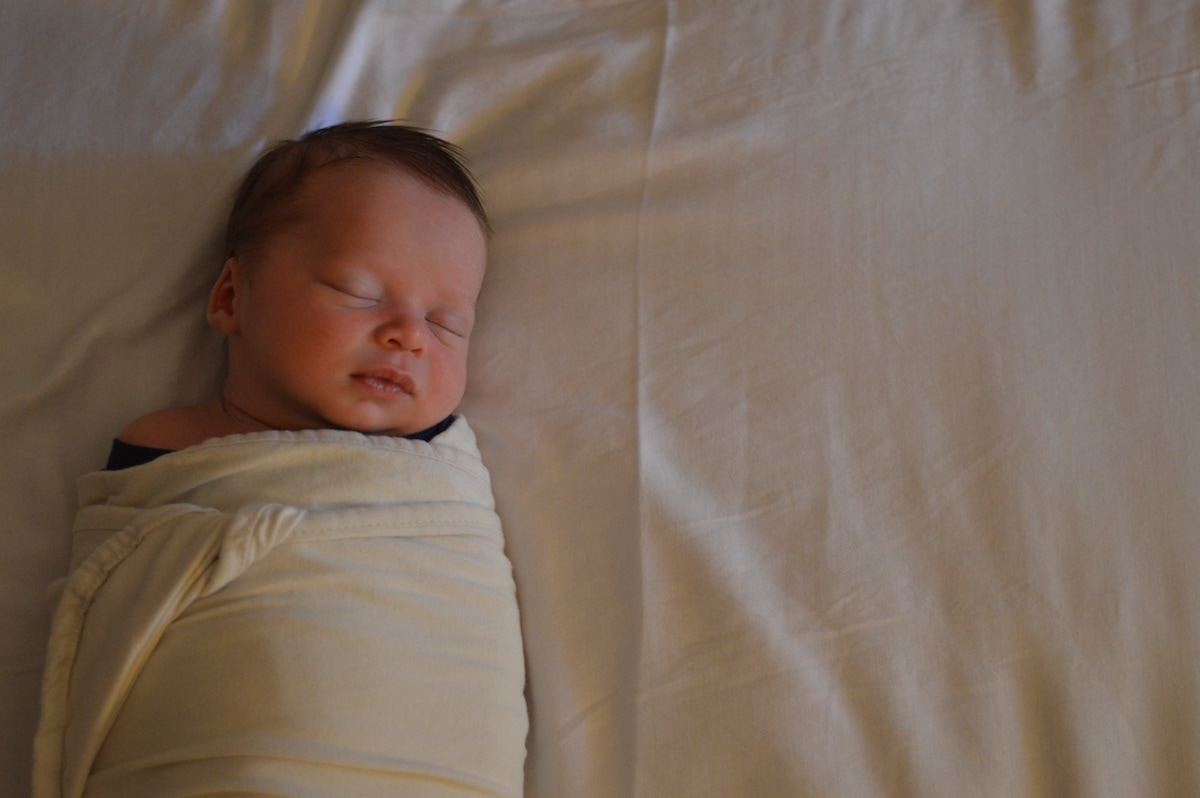
Baby Milestones to Expect During Weeks 0-4
- By week 1, baby already recognizes your voice! Talking to them is a soothing source of comfort.
- By week 2, baby can focus on objects about eight inches away from their face–they may start to notice you or track your face while nursing!
- By week 3, baby can start snuggling instead of jerking around. Enjoy those sweet times together!
Newborn Baby Development: Weeks 4-8
The first month is down, and the baby’s sleep patterns are starting to take shape. If you’re having trouble and you’re wanting to help your infant get longer stretches of sleep, here’s how you can facilitate that!
This is also a time when many women experience postpartum depression. For me, it was around the 6 week marker when I started to notice the signs and symptoms.
If you are feeling down or struggling to feel the joy you want to feel, remember you’re not alone. MANY mamas have faced these same feelings. Don’t keep those concerns in, just by speaking them out loud it can be a HUGE step in helping you feel better!
Typically around this time, you will have a follow-up visit with your OBGYN and this is a time to be open and honest about anything you may be feeling about your own mental health and physical health. Trust me, they see and hear it ALL and they are here to HELP!
Also during this time breastfeeding struggles may arise, especially regarding supply dips.
Many mamas return to work six weeks after giving birth and it can be tricky to balance the schedule and pumping!
This is also a common time for Wonder Weeks to start creating chaos in the sleep routine for a baby. Don’t freak out – it means baby development is going through a growth spurt!
While it sounds like this stage is straight up difficult in a lot of ways – it’s also a time when you’ll find yourself feeling more adjusted to life with baby and will feel more connected and bonded and start to see the unique personality of your baby shining through too.
Sample Sleep Schedule for Weeks 4-8
Here is what your eat, wake, sleep schedule might look like by about week 6 (but is likely to be similar if not the same for one month olds all the way up to two months old!)
- 7:00: start of the day, change diaper, eat
- 8:00-8:30: change diaper, awake time
- 8:30-10:30: nap
- 10:30: eat
- 11:30-12:00: change diaper, awake time
- 12:00-2:00: nap
- 2:00: eat
- 3:00-3:30: change diaper, awake time
- 3:30-5:00: nap
- 5:00: eat (I did 3 hours here rather than 3 1/2 because we eat dinner as a family at 6. While this means I can’t actually cook the dinner, we can at least eat it together once my husband cooks it haha)
- 6:00-6:30: change diaper, awake time, family dinner
- 6:30-8:00: nap
- 8:00: awake, bath, ready for bed
- 8:15-9:15: eat
- 9:15-10:30: put to sleep straight from eating
- 10:30-11:30: dream feed (wake her up to feed her then put her right back to bed)
- She was waking up around 5:30 for a middle of the night snack then right back to sleep
This is a really critical time frame when it comes to being as consistent as possible. You are SO CLOSE to having your baby sleep through the night. Just keep sticking to the schedule and having baby take naps in their crib the majority of the naps and soon you will get that full night of sleep you’ve been waiting for and working so hard towards!
Here are more tips for getting your baby to sleep longer stretches at night.
Baby Developmental Milestones to Expect During Weeks 4-8
- At one month old, baby will start to make sounds other than crying, especially in response to you or Daddy!
- By week 6, your baby may start smiling at you!
- By week 7, baby’s five senses will start developing. They can recognize when sounds come from objects and can distinguish bright colors from black and white.
Newborn Baby Development: Weeks 8-12
2-month-old babies are starting to handle longer awake times. Knowing how to spend this time can be a huge game changer! It’s a good idea to start introducing independent playtime, which teaches your baby how to entertain themselves. An extremely important and helpful skill, not just for Mama, but for their own development!
You can also check out the best toys for independent playtime and how to implement a pack-n-play into the routine for your 8-12 week old baby. Independent playtime has many benefits which also include providing an opportunity to spend some time with your older children while baby is happily playing without needing any adult intervention.
This is also the time when most parents start to experience the dreaded 45 minute intruder. Your little one goes down for nap like a dream. They fall asleep quickly, with little fussing. But then halfway into their daytime naps, they wake up and it seems impossible to get them back to sleep!
Here’s how to troubleshoot those issues and get them back into a deep sleep! Sometimes babies also experience the four month sleep regression a little early so if you think your baby sleep problems may have to do with sleep regressions read this post!
At this stage of baby development, their temperament is much more clear and knowing your baby’s temperament can help in knowing how to best parent them too.
It’s fully possible to have your baby sleeping through the night by week 10. It happened with all four of my kiddos, so I know you can do it too! Here’s my guide on how to get your babies sleeping through the night!
Some babies require more sleep while some seem like they need very little. Wondering if your baby is a high or low sleep needs baby? Here’s how to tell the difference!
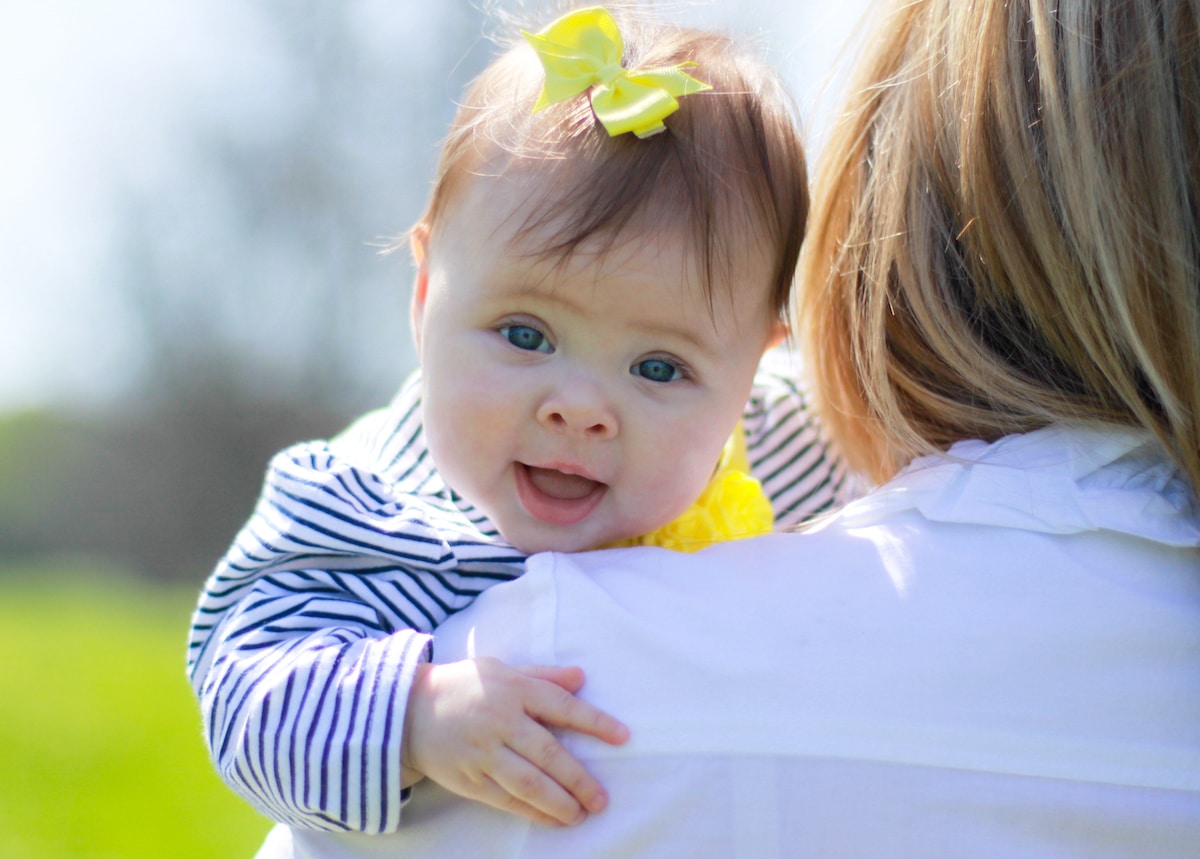
Babywise Sleep Schedule for a 2-Month-Old Baby
- 7:00: start the day, change diaper, eat
- 8:00-8:30: change diaper, get dressed, awake time
- 8:30-10:30: nap
- 10:30-11:30: eat
- 11:30-12:00: change diaper, awake time
- 12:00-2:00: nap
- 2:00-3:00: eat
- 3:00-3:30: change diaper, awake time, alone time with Mommy
- 3:30-5:00: nap
- 5:00-6:00: eat
- 6:00-6:30: change diaper, awake time, family dinner
- 6:30-8:20: nap
- 8:20: awake, bath, put pjs on
- 8:30-9:30: eat, last feeding of day
- 9:30: put directly to bed after eating
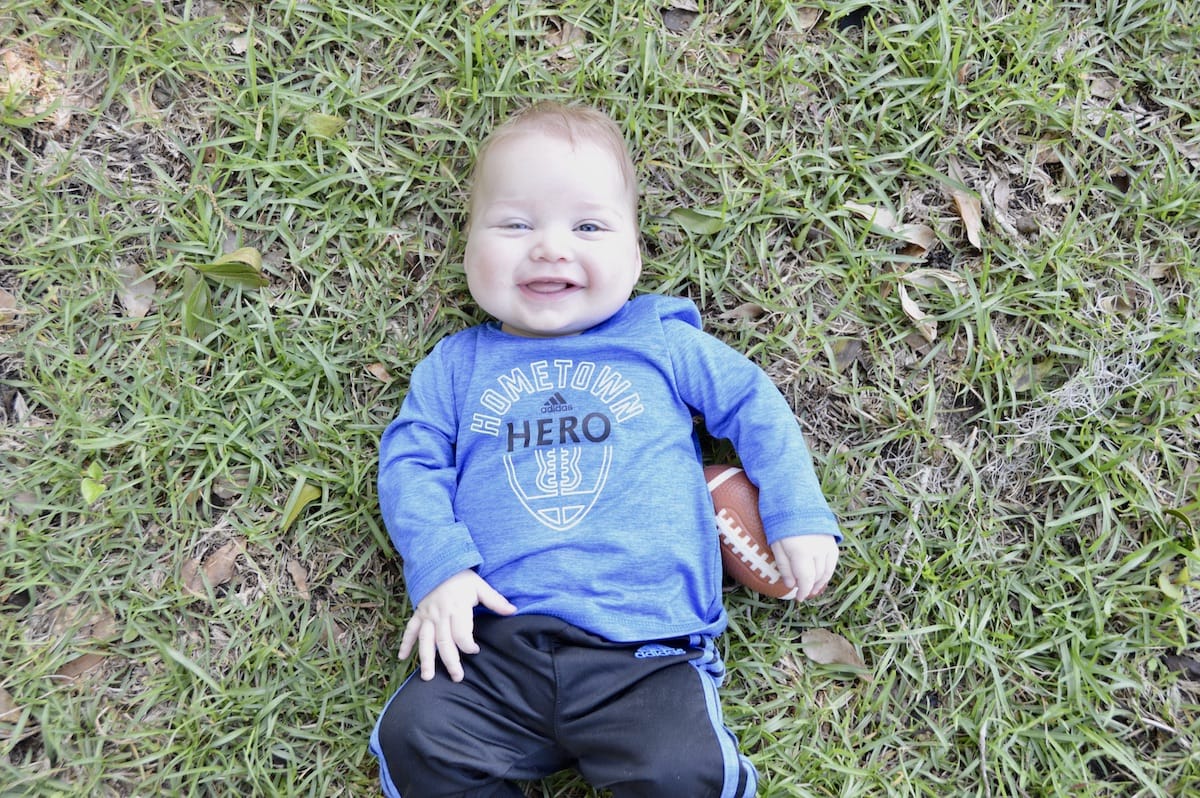
Baby Development Milestones to Expect During Weeks 8-12
- Baby’s neck muscles will continue to strengthen by the time they’re two months old. They can’t support their own head yet, but they may be able to lift it up a little. Tummy time will help encourage them to practice!
- By week 9, baby is really attentive to sounds and they love high pitches especially. Cooing and baby talking at them is sure to delight them!
- By week 12, baby has become aware of their hands and it has rocked their world!
Infant Summaries: 3-6 Months
Three Month Old Baby Development
By three months of age, your baby is doing more than just smiling: this is also the time when most babies start cooing, babbling, and laughing at random! These moments of baby development in the first year are so sweet and precious. They may even start stringing syllables together as they start to grasp the very beginnings of language!
Hand-eye coordination skills begin to develop further during this month as well as they grab for anything that captures their interest… usually with intentions of putting it in their mouth, which is how babies learn about their world! Bright colors, fun textures, and musical toys will delight and enchant your little one!
By week 15, baby may have figured out how to roll over, front to back or back to front. Soon, they may be rolling across the floor. Exciting, but also worth taking precautions for! By this time, you will want to drop the swaddle!
Even though babies at this age are becoming stronger and more in control of their limbs, SIDS is still something to be aware of and it is crucial to make sure you’re implementing safe sleep practices and being consistent with all caregivers. Infant mortality isn’t something any of us like to think about but the data in the health care industry reminds us that sudden infant death syndrome actually peaks around ages 2-4 months with a steep decline after 6 months.
Tummy time is a great thing to continue at this stage, even if they may protest! It’s essential for strengthening their neck, back, and arm muscles. They will likely be able to lift their heads 90 degrees at this point thanks to the exercise!
Baby’s wake window becomes longer by this time which means more independent playtime and bonding with siblings!
You’ve likely been able to drop nighttime feedings by now which is absolutely glorious! Sleep deprivation for mom is on the decline… finally!!!
Of course, as one thing gets a little easier, others may get a bit trickier. Around this age, babies may begin showing signs of teething which can cause pain and sleep disruption, even though a first tooth may not still appear for several months. Be mindful of your baby’s weight and age and review the current recommendations and guidelines from the American Academy of Pediatrics as well as the Center for Disease Control if you’re considering giving any medicine to help ease the teething pain. I have lots of other helpful teething tips here!
This is also a good time to check in on your baby’s car seat – review the instructions and make sure you don’t need to make any changes or adjustments to continue keeping your baby as safe as possible while in the car!
3-Month-Old Baby Sleep Schedule
Between 3 and 6 months, Babywise suggests transitioning to the 4-hour schedule. Every baby is a little bit different, but you can usually tell when they start sleeping very solid during their daytime naps and have to be woken up to eat!

If your baby isn’t quite ready for the 4-hour schedule but is getting there, you can either keep them on a 3-hour schedule or do a 3-3.5 hour schedule instead! That’s what I did with Britt, my second child, and it worked out great!
Every baby has different sleep needs and the amount of sleep depends not only on how old they are, but how they’re made. Identifying if your child is a high or low sleep needs baby will determine how much sleep they need and explain why they’re prone to longer naps or short naps.
Having multiple children can make daily schedules a bit tricky, my rule of thumb is to always put the baby’s sleep needs first for the first year of life and revolve all other children’s schedules around that! When baby is well-rested, everyone benefits.
Speaking of siblings, be sure to carve out some free time to take older children on a “mommy date” too! It’s a great way to help them feel special, even just a quick grocery run where they get to push the cart can make a huge impact. Toddler’s baby sleep and mama’s rest time moments are all important to consider when establishing that daily schedule:
- 7:00: start the day, baby wakes, diaper changes, eat
- 8:00-8:30: change diaper, get dressed, awake time
- 8:30-10:30: nap
- 10:30-11:30: eat
- 11:30-12:00: change diaper, awake time
- 12:00-2:00: nap
- 2:00-3:00: eat
- 3:00-3:30: change diaper, awake time, alone time with Mommy
- 3:30-5:00: nap
- 5:00-6:00: eat
- 6:00-6:30: change diaper, awake time, family dinner
- 6:30-8:20: nap
- 8:20: awake, bath, put pjs on
- 8:30-9:30: eat, last feeding of day
- 9:30: put directly to bed after eating
Infant Development Milestones in Month 3
- Baby will start laughing out loud – so cute!
- Baby may also start stringing sounds together into baby babble, the first step toward saying words!
- Baby may be able to handle longer awake times, which means she may be ready to move to a 4-hour schedule and be introduced to independent playtime.
- Baby will most likely figure out how to roll over in one direction and turn in the direction of a sound. She’s taken her first step to being mobile!
- Baby may also be able to lift her head 90 degrees thanks to tummy time practice!
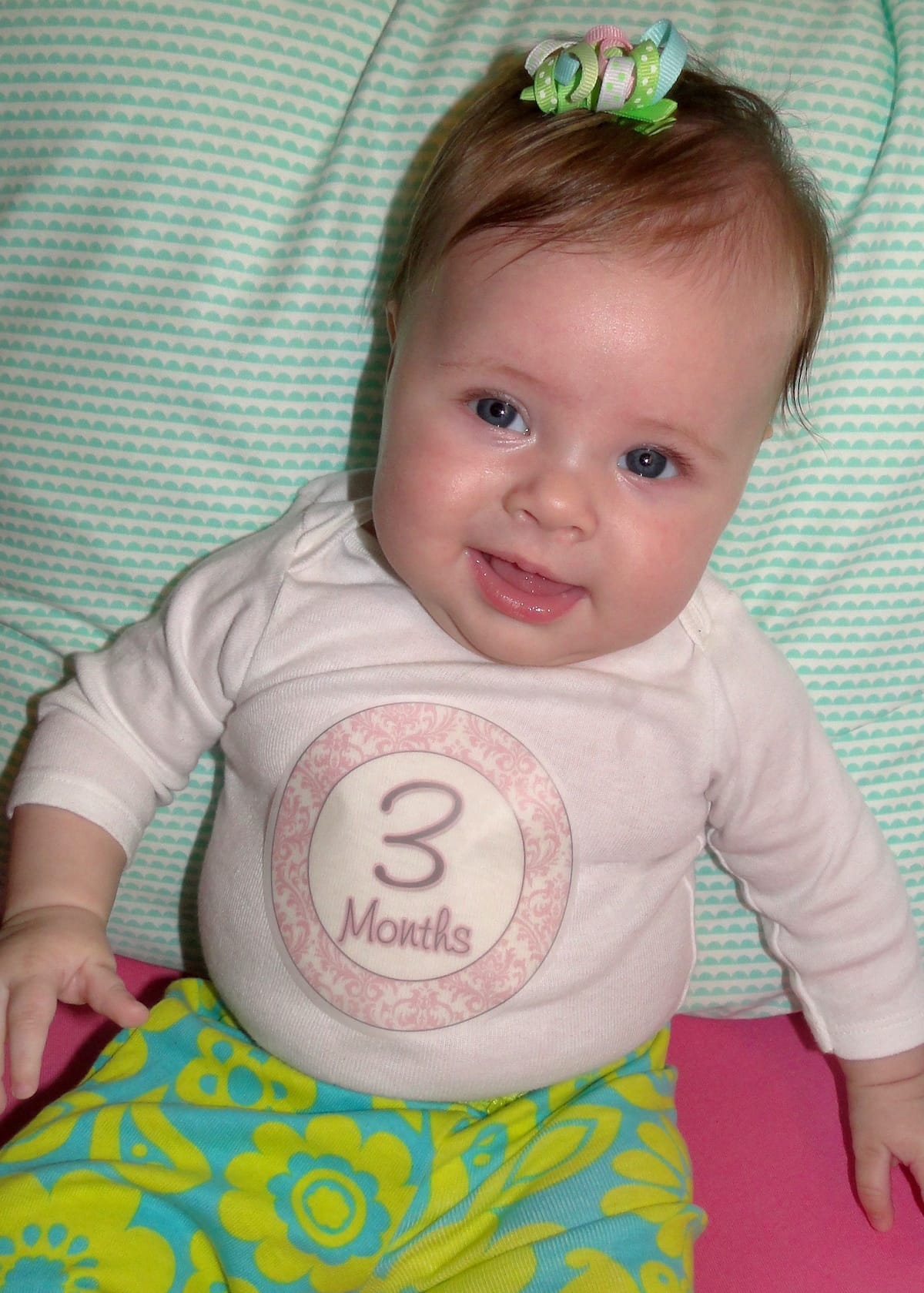
Four Month Old Baby Development
Four month old babies are developing those social skills and their little personalities have really started to emerge! They often laugh a lot, blow raspberries, make plenty of babbling sounds and string syllables together that may sound like words! They’re not quite talking yet but… their first words are not far behind!!!
Talking to them and making eye contact with them is huge for their development and is the best way to boost those language skills!
Tummy time is still a great activity for their development and by this time, they will probably be able to push up to their elbows as well as lift their head 90 degrees! Don’t be surprised if your four month old baby sleep is a little bit impacted by all the new skills he or she is practicing – who needs lots of hours sleep when you can be rolling around in your crib instead, right? 😉
Independent playtime may be easier for them because, by this time, they may be content to sit by themselves and watch everything happen around them. This is because their eyesight and depth perception are well-developed and they’re able to entertain themselves by looking around or playing with their hands!
They can focus and follow objects and may reach for things they want… and get frustrated when they can’t reach it!
A lot of babies can also bear some weight in their legs when held upright.
At this stage you are most likely getting pretty well adjusted to having a baby sleep longer stretches and have solid daytime sleep, but babies love to throw a good curve ball at you 😉 You may experience 4 month sleep regression with your baby and if you do, here’s what to do about it!
It’s important to remind yourself that you’re doing a GREAT JOB! If it feels overwhelming, take a break. Make sure to carve out time for yourself in your schedule too – and get outside for your health if at all possible. There is just something about 20 minutes of fresh air that helps keep even the most frustrating moments in perspective.
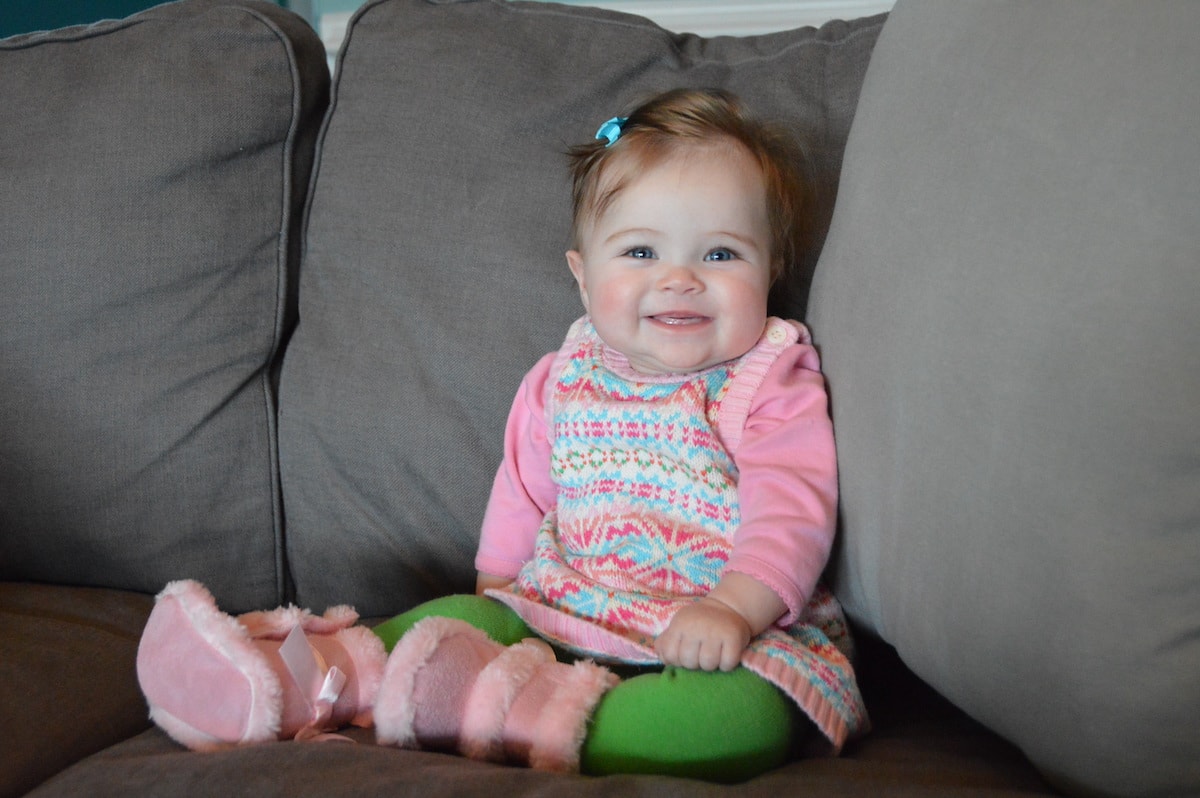
4 Month Old Sample Baby Schedules
By this time, most of my babies had transitioned to a 4-hour schedule. This is a very detailed summary of the eat, wake, baby sleep schedule I followed with Britt, baby number 2. This sample sleep schedule may also help you get a good idea of what a 24-hour period and daily routine looks like with multiple kids, especially with Babywise!
- 7:00: start the day, change diaper, eat.
- My three year old eats breakfast with my husband while I nurse her.
- After breakfast: tummy time (10 minutes per awake time, three times a day) or independent playtime (15 minutes per awake time, three times a day)
- If Kye (my son) doesn’t have school they will have sibling time together in the pack and play after independent playtime.
- During morning awake time I get her dressed and change her diaper. If Kye has school and I take him then we do rush a good bit!
- 8:45-9:00: Down for nap. I sing to her, swaddle her, turn on her fan and put her down. She will usually “talk” and “babble” for a few minutes before falling asleep.
- If Kye is home he will go upstairs for his room time (45 minutes) and will enjoy his movie time while I nurse Britt at 11:00.
- 11:00: Wake Britt up, change the diaper, nurse.
- If we need to run an errand we do it during this awake time. I will pump at bottle at 10:00 and wake Britt up at 10:40 then hop in the car and go.
- I will feed her the bottle once we arrive at the location for the errand, run the errand and be home before her next nap time!
- If we are home then following her nursing session at 11:00 we will do the same routine as the morning awake time. Including tummy time and independent playtime.
- While Britt is doing her independent playtime I’m able to get lunch prepared for Kye!
- 12:00: Kye has his lunch (on school days he doesn’t get home until closer to 12:30). This is the trickiest time of the day!
- Once Kye finishes lunch we all read a book together and pray together. Kye will then go potty and put his PJs on while I’m putting Britt to bed.
- 1:00: Both kids down for a nap! This is my big chunk of alone time each day to get things done.
- 3:00: Britt’s up to nurse. Usually, Kye sleeps until 3:30 but if he’s awake at 3 I just let him get up. If he’s up he will sit and play nicely while she nurses.
- After Feeding: We go in and wake up Kye by 4:00 if he’s not already up. Then we cuddle and play in his bed just the three of us for a bit.
- Kye then puts back on his clothes and Britt has her tummy time and independent playtime.
- 5:00: Zach gets home from work, Britt goes down for her evening nap. This naptime is nice as it allows me to cook dinner!
- 6:00: Dinner time. Britt usually wakes up at this time crying (usually this is her only tough nap of the day, which is typical at this age).
- We let her fuss until 6:20. If she isn’t back to sleep by then, we go ahead and get her up. It’s normal for babies to experience a “witching hour” which is their most fussy time of the day and it is typically in the evening time.
- 6:40: If Britt is still sleeping, Zach and Kye get her up for bathtime. I clean up dinner so Zach can have quality time with Britt during the bath.
- After bathtime, I go in and do a baby massage with Britt before getting her ready for bed.
- 7:00: I nurse Britt for her bedtime feeding. Zach gives Kye his bath.
- Kye was going to bed at 7:15 but we bumped it up to 7:45 and it’s allowed him to have longer baths and have more time for stories and cuddles before bed and is helping him sleep better at nap.
- We all say prayers together (I’m typically still nursing Brittlynn when Kye is heading to bed!)
- Brittlynn usually finishes her nightly nursing session sometime around 8:00.
- When she’s close to finishing I will go ahead and swaddle her then top her off and put her straight to bed!
- Often she is asleep when I lay her down but if she’s awake then I sing a song to her and say a prayer with her too.
- 10:30: I usually pump before going to bed to avoid being super full in the morning (although I usually still wake up pretty full).
Baby Development Milestones in Month 4
- Makes vowel sounds and strings sounds together to make almost-words
- Rolls over
- Can track moving things with their eyes and recognize specific people and things, including themselves in the mirror!
Five Month Old Development
At five months old, babies are all personality and exploration! This is when they start to understand object permanence, which means they’re more likely to respond to and enjoy games like “peek-a-boo!” So fun!
Babies start moving around on the floor a lot more at this point, too. They may not be crawling quite yet, but they creep around and turn around to follow sights and sounds.
Upper body strength is pretty well-developed and it’s time for the legs and torso to have their turn! Holding them in an upright standing or sitting position will help strengthen those muscles and get them ready for crawling and walking!
Baby may also be able to recognize her name as her hearing and vision become fully developed!
Sleep schedules get easier, as baby is pretty well-adjusted to their bedtime routine and is most likely on the 4-hour sleep schedule. She sleeps longer stretches at night and might even be sleeping through the night for a total of 10 to 12 hours. The four hour sleep schedule allows for longer wake windows and time together. Typically the four hour schedule also more easily aligns with older siblings and your infant and toddler sleep may even align smoothly for you to get a nice chunk of time during the day for yourself!
This is typically a bit of a slower developmental stage with less likely chance of any major baby growth spurt. The four month time period is filled with a lot of leaps whereas things cool off a bit (and Mommy gets a little break) with a 5-month-old baby. This is a great time for you to catch up on some of those sleepless nights and get some good deep sleep for YOU!
A lower sleep needs baby may begin to have some sleep problems with the evening cat nap. It may be impacting other naps and causing shorter naps over all. Many babies drop the evening cat nap around the six-month mark but some may want to try dropping it a little earlier. This cat nap being dropped changes the nap schedule but does not typically cause any major changes in the baby’s sleep schedule or baby’s day overall. Feeding schedules and baby’s needs overall remain the same. It’s usually one of the smoother transitions during the first year 😉
Here is everything you need to know about dropping the third nap!
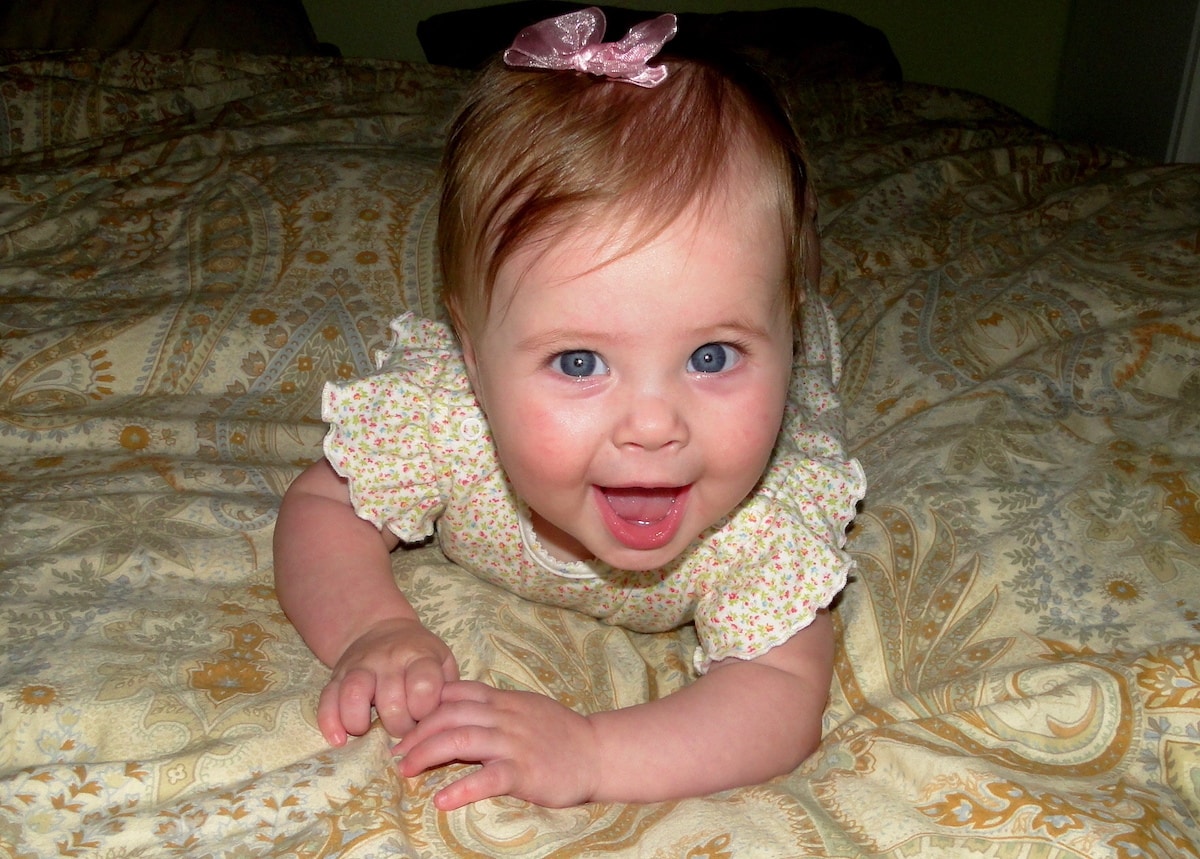
5 Month Old Sleep Schedule
- 6:45-7:15: Wake up, change diaper, nurse (no solids yet…still just nursing her!)
- After nursing: Independent Playtime
- 8:35ish: Bible Storytime
- 8:45-9:00: Down for nap (Kye has room time during her nap)
- 10:45-11:15: Up from nap, change diaper, nurse (Kye usually watches movie while I nurse her for this feeding)
- After nursing: Independent Playtime
- 12:45-12:55: Down for nap
- 2:45-3:15: Up from nap, diaper change, nurse
- After nursing: Independent Playtime
- 4:45: Down for nap
- 7:00: Nurse
- 7:20: Family story time, family prayers
- 7:35: Brittlynn down for the night
- 7:45 Kye down for the night
Baby Development Milestones in Month 5
- Baby may start creeping around the floor for the first time (preparing to crawl!)
- Baby may be able to sit up almost on their own or bear more weight in their legs when held upright
- Recognizes/responds to her name

Baby Development in the First Year: 6-9 Months
Six Month Old Baby Development
Halfway through the first year already? How did this happen, right? Baby is becoming more aware of the world around them and from here on out, they will spend a lot of time putting things in their mouths, dropping toys, and banging things around. This is how they learn about their surroundings!
It is also best to wait to introduce solids until six months old. Once we introduce solids I like to use the Baby-Led Weaning Method.
There are many benefits to baby-led weaning and I have many tips and tricks to help get you started, including the best supplies for baby-led weaning and a guide for the 30 first solid foods you should introduce to your baby!
Most six month olds are also ready to be introduced to the sippy cup at this time!
They also tend to handle longer stretches of awake time, which means more time for independent play and sibling bonding! If you’re wondering if baby is getting too much sleep (or not enough sleep), you may want to read up on high versus low sleep needs babies.
Learning your baby’s sleep cues will help prevent overtiredness (babies are easily overstimulated during awake times) which can lead to disruptions in their sleep stages. I don’t know about you, but I’m all for baby’s sleep cycle! A well-rested baby is a happy baby (and a happy mom!)
And now that you’re, hopefully, well past the 4 month sleep regression you def don’t want to deal with any more sleep problems for as long as possible 😉
Many babies will also be able to sit up by themselves at six to six and a half months, but it varies from child to child, so if your baby isn’t quite ready to support themselves yet, don’t worry! That’s totally normal in baby development! Either way, it’s a good idea to prop them up with some pillows to make sure they don’t fall over.
Sample Sleep Schedules: 6 Months Old
By six months old, your baby is likely on the 4-hour schedule, which makes so many things so much easier! They are also most likely on the 2-nap schedule, which is an added bonus!
I’m still following the guidelines of the Babywise method, which I used with all 4 of my kids with great success! You may have heard of other sleep training methods such as Moms on Call (which is very similar), so it’s really just a matter of finding what works for you and your family.
This is the morning to bedtime routine my second-born, Britt, was one by the time she was 6 months of age, including her sample feeding schedule. I like sharing the baby sleep schedules of my little one that also show my toddler’s schedule at that age. Remember the rule of thumb: put baby’s sleep needs first the first year but toddler sleep is still important to keep in mind! Baby schedules are about the WHOLE family and making things work for your family unit as a whole.
- 6:45-7:15: Wake up, change diaper, nurse (no solids yet…still just nursing her!)
- After nursing: Independent Playtime
- 8:35ish: Bible Storytime
- 8:45-9:00: Down for nap (Kye has room time during her nap schedule)
- 10:45-11:15: Up from nap, change diaper, nurse (Kye usually watches movie while I nurse her for this feeding)
- After nursing: Independent Playtime
- 12:45-12:55: Down for nap
- 2:45-3:15: Up from nap, diaper change, nurse
- After nursing: Independent Playtime
- 4:45: Nap time
- 7:00: Nurse
- 7:20: Family story time, family prayers
- 7:35: Brittlynn down for the night
- 7:45 Kye down for the night
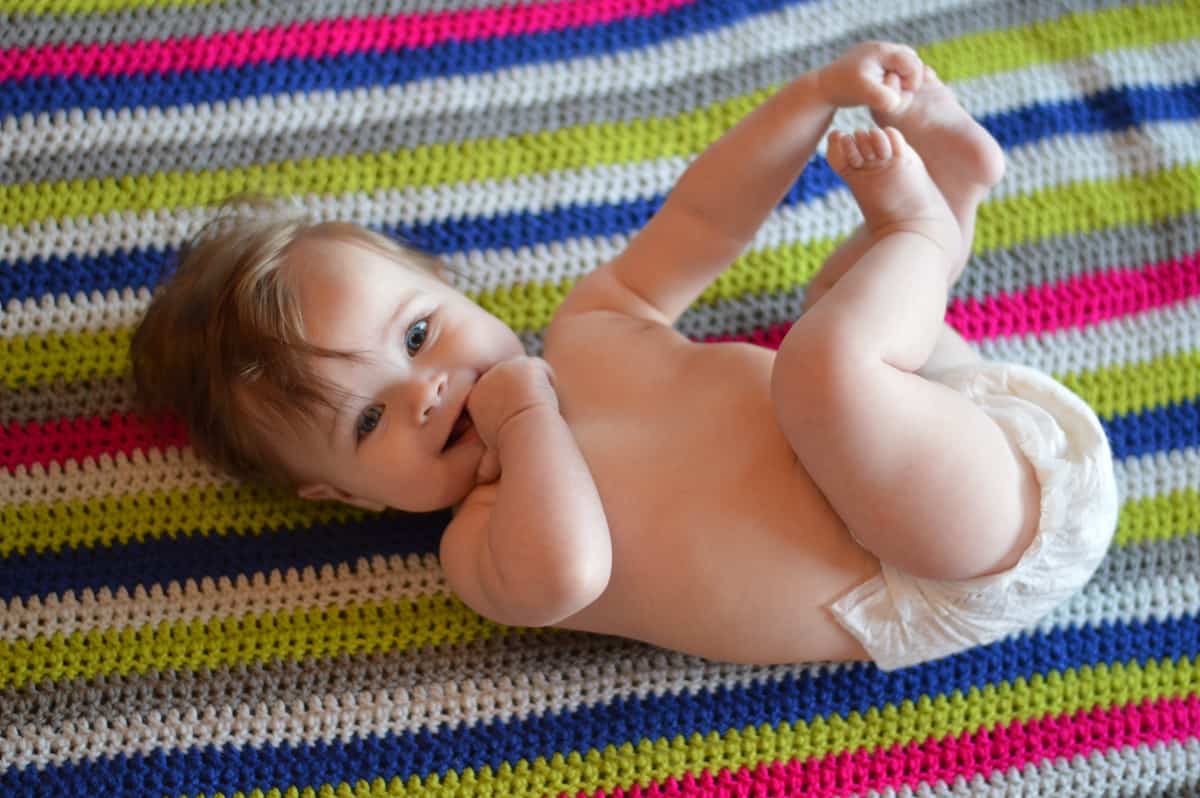
Baby Development Milestones During Month 6
- Baby will possibly be able to sit up by themselves
- Can bear weight in their legs when held upright
- Possibly time to introduce them to solid foods and sippy cup!
- Use their hands more: drops things, grabs things to put in mouth, even clapping or imitating your hand movements!
Seven Month Old Baby Development
Most 7-month-old babies can sit up unsupported by now, and it’s very likely that your seven month old is crawling or on their way to crawling as well! They may also be rolling across the floor, creeping (propelling themselves forward using their tummy), or pushing themselves up on their hands and knees. Anything to get mobile as their muscles continue to develop!
This is also about the time that the “pincer grasp” starts to develop–the ability to hold objects between their thumb and forefinger. You can feed them cheerios or other small foods to help them develop this skill, but just be careful of any small toys that could pose choking hazards!
It’s also possible, depending on the baby, for them to get their first tooth by now, but this can also happen later on down the road. Like I said above, many of milestones from here on out are really dependent on the individual baby!

Sample Sleep Schedules: 7 Months Old
This is an example of an eat-wake-sleep schedule you might implement with a 7-month-old. The sleep routine and wake times are pretty similar to that of a 6 month old, but in my case, this was the schedule I used for my third child, Tess. So I already had my hands full with two kids by then, but this could be easily adapted depending on your situation!
- 7:00 up for the day. Nurse and then do solids.
- 25 min independent playtime, if not taking kids to school
- 9:00 down for nap
- 10:45-11:15 up from nap, nurse
- 12:30 solids with kids after school for lunch
- 1:00 last nap
- 2:45-3:15 up from nap and nurse. Sometimes she will still sleep a little later, but usually she’s awake right at 3.
- 25 min of independent playtime
- 5:30-6:00 solids during family dinner
- 6:30 (or a little earlier) bath
- 6:45 nurse then straight to bed
Baby Development Milestones During Month 7
- Sit up unsupported
- Creeping, rolling, and/or crawling
- First tooth, possibly
- Pincer grasp
- Continues to enjoy social interaction and responds well to games like peek-a-boo

Eight Month Old Summary
At eight months old, baby’s personality really starts to emerge, as do their likes and dislikes. They’re continuing to mature and learn more about the world around them, playing with toys, babbling and baby-talking.
This may even be the time when they start saying their first words, or at the very least, stringing syllables together into almost-words! If “mama” and “dada” haven’t happened yet, they’re coming soon!
Do not be alarmed if baby is not yet talking or babbling, many babies (especially those with older siblings) develop at their own pace. Speech delay will reveal itself with time, usually by age two. So don’t stress over this! Your baby hearing you talk is the best way to encourage language development.
Once again, if baby hasn’t started crawling by now, this may be the month! In any case, she’ll be looking to get mobile and maybe even pull herself up into a standing position!
It is very normal for babies who are going through growth spurts or developmental leaps to struggle falling asleep or wake up earlier (especially during daytime sleep) because they want to practice their new skills. I’d often find my babies up on all fours swaying in their crib as they tried to figure the whole crawling thing out. Often the crib is the first place baby begins standing and you will lay them down for bedtime only to find them on the monitor standing up smiling at you 😉 Do not overly stress about this!
I remind myself when it comes to babies sleep “you can lead a horse to water but you can’t make him drink.” As long as baby is happy and content, stick to your schedule and routine and don’t let their crib playtime cause you to lose any sleep yourself! You set up the best sleep environment possible, but you can’t force your baby to actually sleep!
Other totally normal baby development changes include shyness toward strangers, clinginess toward Mom and Dad or separation anxiety, and attachment to a comfort object like a blankie. Their understanding of the world around them is expanding as they become more aware of themselves, you, and others!
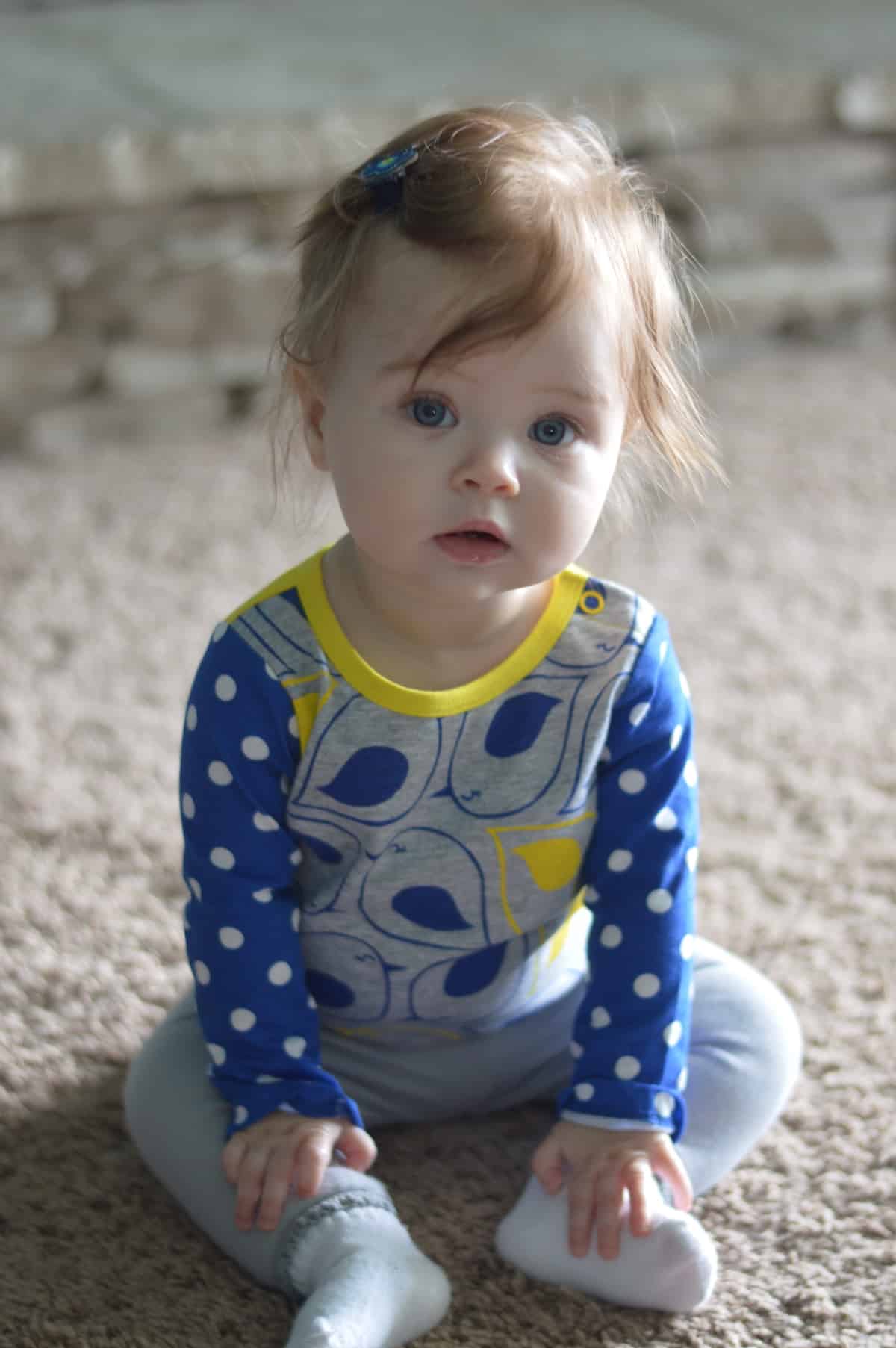
Sample Sleep Schedule: 8 Months Old
Here is a sample schedule for an 8 month old baby sleep schedule in a 24-hour period. Once again, I already had two kiddos at the time, but as you can see, the older baby gets, the more simplified the schedule becomes! A huge relief for Mom!
At this age, you will most likely start to hear people comment on how great of a sleeper your baby is, if you haven’t already! Your hard work in establishing consistent night sleep and daily routine early on is now providing you and your baby with a solid, easy to follow 8 month schedule with a great two hour nap in the morning and in the afternoon! Who says you can’t get things done with a baby at home? 😉
The start bedtime routine continues to be important throughout the entire first year and really forever right? We all need some wind-down time and a solid nightly routine to help us prepare for bedtime and to achieve our ideal sleep for the night. Baby sleep training can be beneficial for us adults too and helps remind us to prioritize our own sleep schedules. Here’s a sample of my babywise schedules – an 8 month old schedule:
- 7:00 up for the day. Nurse and then do solids.
- 25 min independent playtime, if not taking kids to school
- 9:00 down for morning nap
- 10:45-11:15 up from nap, nurse
- 12:30 solids with kids after school for lunch
- 1:00 afternoon nap
- 2:45-3:00 up from nap and nurse
- 25 min of independent playtime
- 5:30-6:00 solids during family dinner
- 6:30 (or a little earlier) bath
- 6:45 nurse then straight to bed for nighttime sleep
Baby Development Milestones During Month 8
- First words might happen at this time!
- Baby might start crawling if they haven’t already
- Pulling themselves up into a standing position using furniture or walls
- Understand or recognize basic words
- Forming memories of how things like toys function

Baby Development in the First Year: 9-12 Months
Baby Development: Nine Months Old
Nine months old is when many babies start saying their first words… so keep your eyes and ears open for “mama,” “dada,” and anything else baby might have to say! But if they don’t utter the magic words this month, don’t fret. That’s also normal!
Either way, baby is getting ready to talk, which means that she starts understanding more words, too. So keep talking to them and reading to them to encourage that development!
At nine months it is also common for babies to start crawling. In any case, now is the time to start baby-proofing your house if you haven’t already! And don’t be surprised if, once she’s mobile, she leaves destruction in her wake. This is how she learns about the world around her!
Another way nine-month-olds do this is by grabbing everything they can get their hands and throwing it, banging it, or sticking it into their mouths. As long as it’s not dirty or a choking hazard, this is good for their development!
This is also the point when baby will likely start imitating you!
9 Month Old Sleep Schedules
Here is an example of what a daily schedule might like look for a nine month old baby. Obviously, feel free to use this as a template but adjust for your family’s needs and lifestyle! It’s just to give you an idea.
- 6:45-7:15: Get up then nurse
- Solids
- 9:00-11:00: Nap
- 10:45-11:15: Get up then nurse
- 12:00ish: Solids
- 1:00-3:00: Nap
- 2:45-3:15: Get up then nurse
- 6:00: Solids for dinner with family
- 6:40: Bath
- 7:00: Nurse then straight to bed
Baby Development Milestones During Month 9
- Possibly their first words!
- Crawling, pulling up to standing and/or moving by holding onto furniture
- Can gesture to things they want
- Clapping or waving
- Imitating Mommy and Daddy
- Attachment to a comfort object
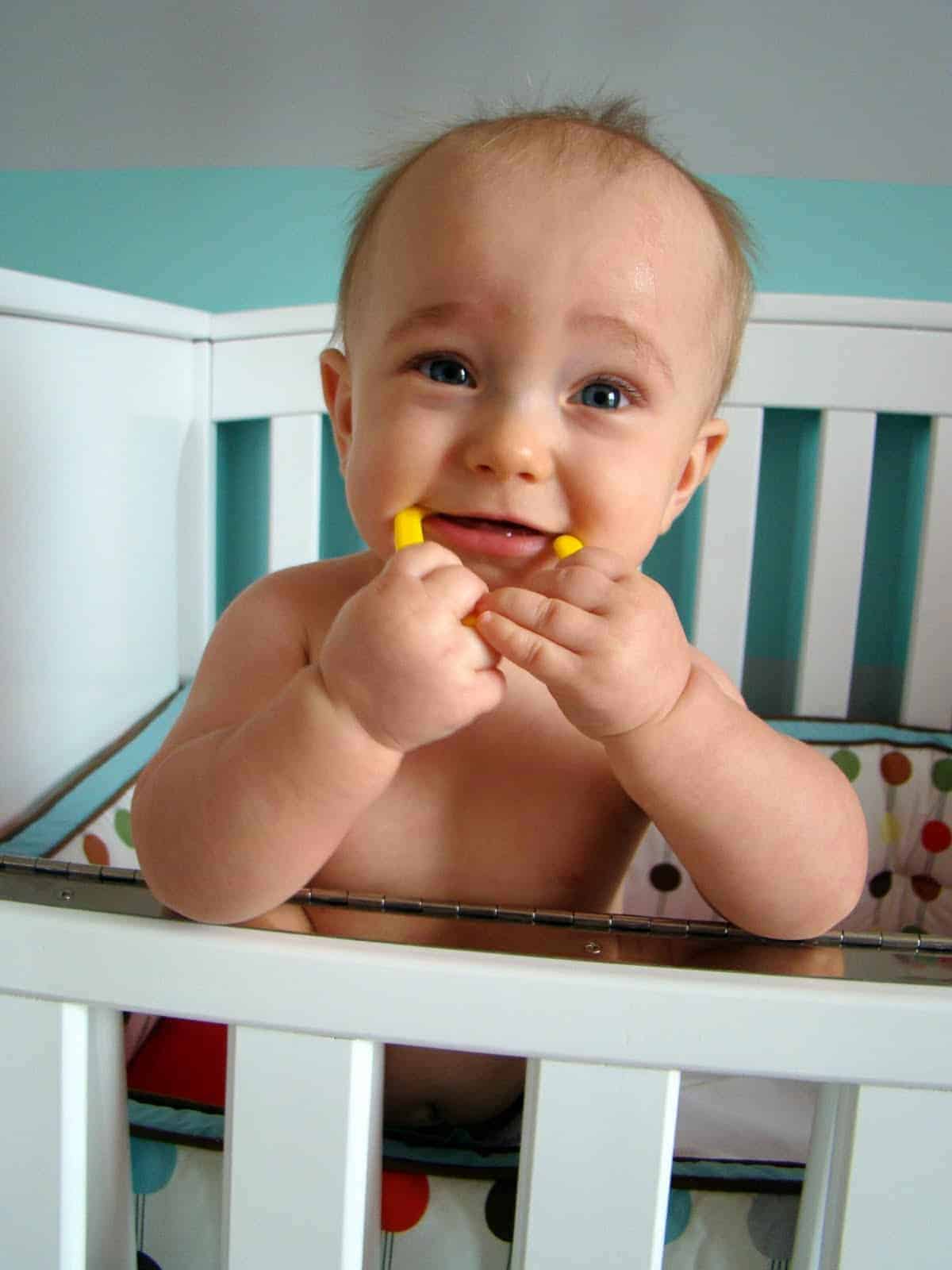
Baby Summaries: Ten Months Old
By now, most babies are on the move and ready to explore… and get into anything they can! They’ll also try to escape the playpen or even the crib. So be sure to keep an eye on him as much as possible! Baby-proof the house if you haven’t yet and start gating off stairs and other off-limits areas.
Now is also the time to start introducing baby to the sippy cup. It’s recommended that they be weaned completely by their first birthday or shortly after, both because it gets more difficult the older they are and because it protects their teeth and overall health! (Source: Cleveland Clinic)
Changes in baby’s behavior or habit patterns are common around this time: because they’re so interested in exploring, they may be less interested in eating. This is totally normal!
Ten month olds also start gaining a firmer grasp of their independence and might get picky with food or finicky to changes in routine. They also might start preferring certain books or videos and wanting to read or watch them over and over again. This is good for their developing brains!
Another thing that 10 month olds commonly start to grasp at this point? Object permanence! If you hide a toy under a blanket or behind your back, they’ll recognize that it still exists even though it’s out of sight and try to find it. They may also respond well to games like peek-a-boo and hide-and-seek!
10 Month Old Sleep Schedules
Here is what a basic day-to-day schedule might look like for a ten month old baby!
- 7:00 Up for day, nurse, breakfast (whole milk in sippy with meal)
- 9:00 Down for nap
- 11:00 Up from nap, nurse, lunch (whole milk in sippy with meal)
- 1:00 Down for nap
- 3:00 Up from nap, sippy of whole milk with some cheese/cheerios as snack
- 6:00 Dinner with family (whole milk sippy with meal)
- 6:30 Bath
- 6:45ish Nurse then straight to bed
Baby Development Milestones During Month 10
- Crawling, pulling to standing, moving around with furniture
- First words, if they haven’t yet!
- Introduction to the sippy cup
- Sense of independence, start expressing preferences or distastes
- Object permanence
- Separation anxiety
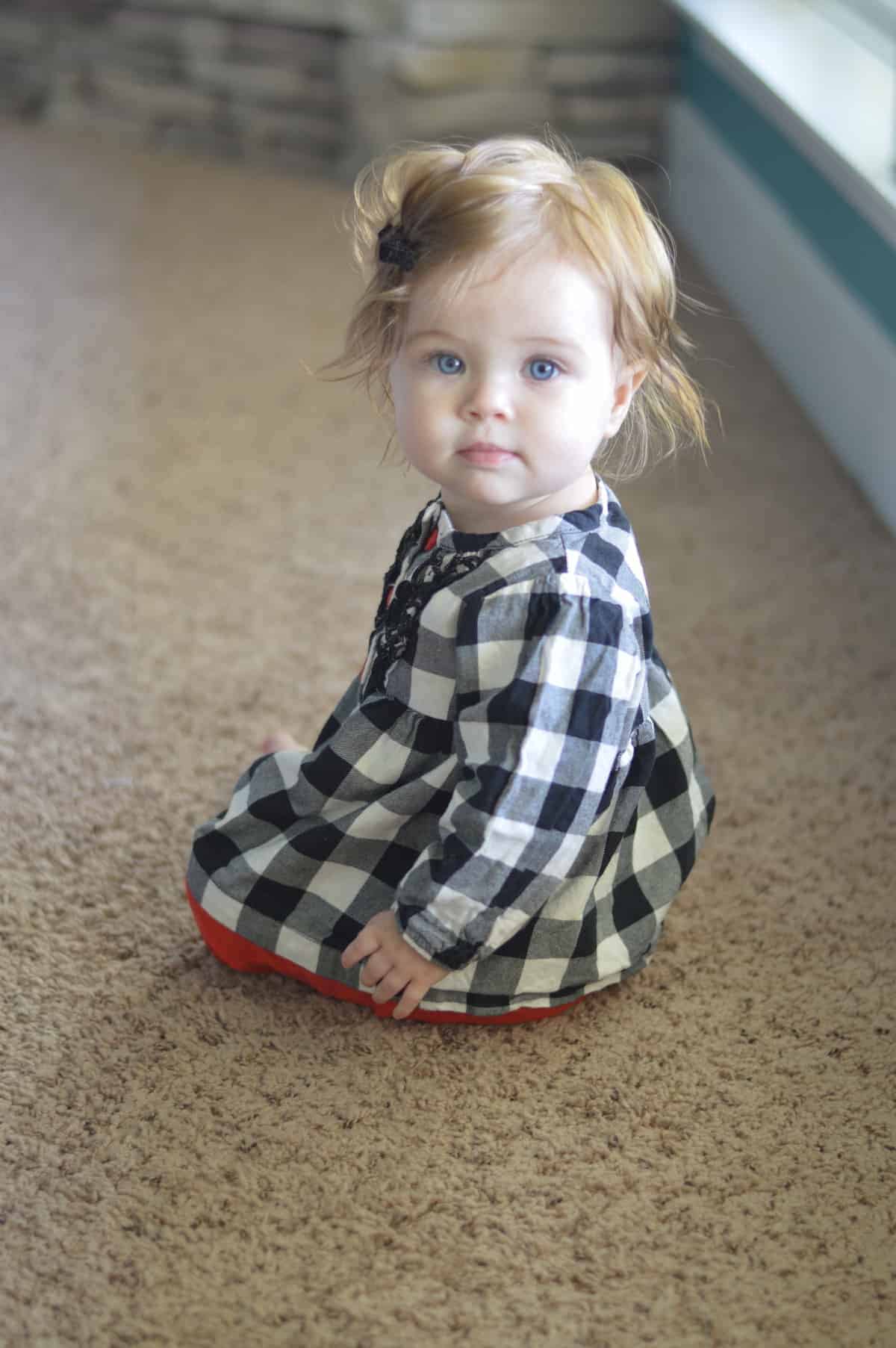
Baby Summaries: Eleven Months Old
Just one short month away from their first birthday! How did this happen already? As you approach the one year mark, you will no doubt notice major signs of development as they prepare to enter the toddler phase. (And yes, at one year old they are considered pre-toddlers or even toddlers! Crazy, right?)
Eleven month olds really start to develop their own, unique personalities and they definitely start forming preferences and expressing their newfound sense of independence.
While baby may not be walking yet (some do, but most babies don’t start walking until after their first birthday!) they will be moving around and getting into things, so keep a sharp eye! You’re probably already well aware of this fact and have baby-proofed accordingly.
Since most babies can pull themselves upright into a standing position to prepare for walking, now is a good time to encourage the use of push toys and rolling activity centers, which help them practice!
This is also a time when many babies say their first words if they haven’t already! They can also copy the sounds you make, imitate your movements, clap, wave, make gestures to signify what they want, and use their pincer grasp to pick up small objects!
11 Month Old Sleep Schedules
Here is the basic outline of a typical 11 month old’s eating and sleeping schedule. A sample baby sleep schedule for your 11 month old. Feel free to use or modify to fit your needs!
- 9:00-11:00 nap
- 11:00 your baby can read movie while I make lunch
- 11:30ish: lunch with whole milk to drink
- 1:00-3:00 nap
- 3:00 small snack (usually dairy) with whole milk to drink
- 5:30 dinner with family (whole milk to drink)
- 6:15 bath
- 6:45 nurse
- When done nursing: straight to bed for night
Milestones Baby Development During Month 11
- First steps, possibly
- First words, if they haven’t yet!
- Clapping and/or waving
- Holds out arms to be picked up
- Pincer grasp
- Imitates Mommy and Daddy

Baby Sample Schedules in the First Year: You’ve Made it to Month 12!
Your little one is growing up quickly. On the one hand, it’s challenging to begin thinking about the future parenting milestones like potty training and weaning from the pacifier or weaning from finger sucking and preparing to transition from the crib to a bed but on the other hand, it’s exciting to see your baby grow and develop – cherish each moment mama! Before you know it, you’ll be celebrating a baby’s first birthday… and getting ready for the toddler and pre-toddler stages, which I’ll be covering in future posts! Until then, here are some other articles with more information to help prepare you for having a one-year-old including what to expect with toddler’s baby sleep and a one year old schedule for your 12 month old:
- Spear Summary of Month 12
- Tess Summary of Month 12
- Brittlynn Summary of Month 12
- Summary of Month 12
- 40+ Best Gift Ideas For a 1 Year Old: Boy, Girl, and Gender Neutral Toys
- The Best Baby Doll for a 1-Year-Old (And Baby Doll Storage Ideas!)
- Best Ride On and Walking Toys for 1 Year Old
- Best Toddler Swimming Pool
- Best Toddler Pool Float
- A Letter to my Son on His 16th Birthday From Mom (Kye’s Bday Letter) - March 20, 2025
- Open Letter to my Daughter on her 12th Birthday – Love, Mom {Britt’s 12th Bday Letter} - January 16, 2025
- Letter to My Son on his 6th Birthday – Love Mom - January 8, 2025






